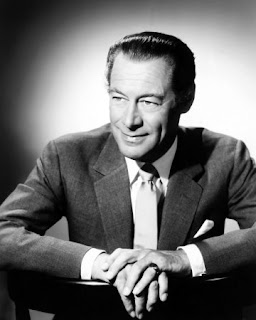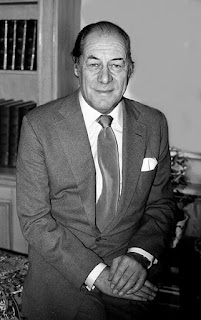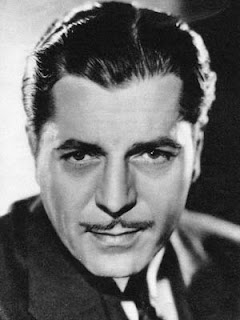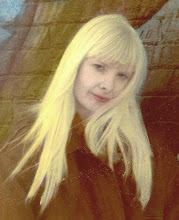
She performed in an assortment of movie roles. She played Calamity Jane opposite Bob Hope in The Paleface (1948) on loan out to Paramount, and Mike "the Torch" Delroy opposite Hope in another western comedy, Son of Paleface (1952), again at Paramount. Russell played Dorothy Shaw in the hit film Gentlemen Prefer Blondes (1953) opposite Marilyn Monroe for 20th Century Fox.
She appeared in two movies opposite Robert Mitchum, His Kind of Woman (1951) and Macao (1952). Other co-stars include Frank Sinatra and Groucho Marx in the comedy Double Dynamite (1951); Victor Mature, Vincent Price and Hoagy Carmichael in The Las Vegas Story (1952); Jeff Chandler in Foxfire (1955); and Clark Gable and Robert Ryan in The Tall Men (1955).
In Howard Hughes's RKO production The French Line (1954), the movie's penultimate moment showed Russell in a form-fitting one-piece bathing suit with strategic cut outs, performing a then-provocative musical number titled "Lookin' for Trouble." In her autobiography, Russell said that the revealing outfit was an alternative to Hughes' original suggestion of a bikini, a very racy choice for a movie costume in 1954. Russell said that she initially wore the bikini in front of her "horrified" movie crew while "feeling very naked."
In 1955, Russell and her first husband, former Los Angeles Rams quarterback Bob Waterfield, formed Russ-Field Productions. They produced Gentlemen Marry Brunettes (1955), The King and Four Queens (1956) starring Clark Gable and Eleanor Parker, Run for the Sun (1956) and The Fuzzy Pink Nightgown (1957), which was a box-office failure. She also starred in Gentlemen Marry Brunettes alongside Jeanne Crain, and in The Revolt of Mamie Stover (1956).
Russell had three husbands: Bob Waterfield, (a UCLA All American, Cleveland Rams quarterback, Los Angeles Rams quarterback, Los Angeles Rams head coach, and Pro Football Hall of Fame member (married on April 24, 1943, then divorced in July 1968)); actor Roger Barrett, (married on August 25, 1968, until his death on November 18, 1968); and the real-estate broker John Calvin Peoples (married January 31, 1974 until his death from heart failure on April 9, 1999). Russell and Peoples lived in Sedona, Arizona for a few years, but spent the majority of their married life residing in Montecito, California. In February 1952, she and Waterfield adopted a baby girl, Tracy. In December 1952, they adopted a fifteen-month-old boy, Thomas, whose birth mother, Hannah McDermott had moved to London to escape poverty in Derry, Northern Ireland, and in 1956 she and Waterfield adopted a nine-month-old boy, Robert John. Due to back street abortions, her first at 18, Russell herself was unable to have children, and in 1955 she founded World Adoption International Fund (WAIF), an organization to place children with adoptive families and which pioneered adoptions from foreign countries by Americans. She described herself as "vigorously pro-life".
At the height of her career, Russell started the "Hollywood Christian Group," a weekly Bible study at her home which was arranged for Christians in the film industry. In 1953 she tried to convert Marilyn Monroe during the filming of Gentlemen Prefer Blondes; Monroe later said "Jane tried to convert me (to religion) and I tried to introduce her to Freud". Russell appeared occasionally on the Praise The Lord program on the Trinity Broadcasting Network, a Christian television channel based in Costa Mesa, California. In 1995, she starred with Charlton Heston, Mickey Rooney and Deborah Winters in the Warren Chaney production, America: A Call to Greatness. Russell was, at times, a prominent Republican Party member who attended Dwight Eisenhower's inauguration along with other notables from Hollywood such as Lou Costello, Dick Powell, June Allyson, Anita Louise and Louella Parsons. She was a recovering alcoholic who had gone into rehab at the age of 79 and described herself in a 2003 interview as "These days I am a teetotal, mean-spirited, right-wing, narrow-minded, conservative Christian bigot, but not a racist.
Russell resided in the Santa Maria Valley along the Central Coast of California. She died at her home in Santa Maria of a respiratory-related illness on February 28, 2011. She was survived by her three children: Thomas Waterfield, Tracy Foundas and Robert Waterfield. Her funeral was held on March 12, 2011 at Pacific Christian Church, Santa Maria.



















